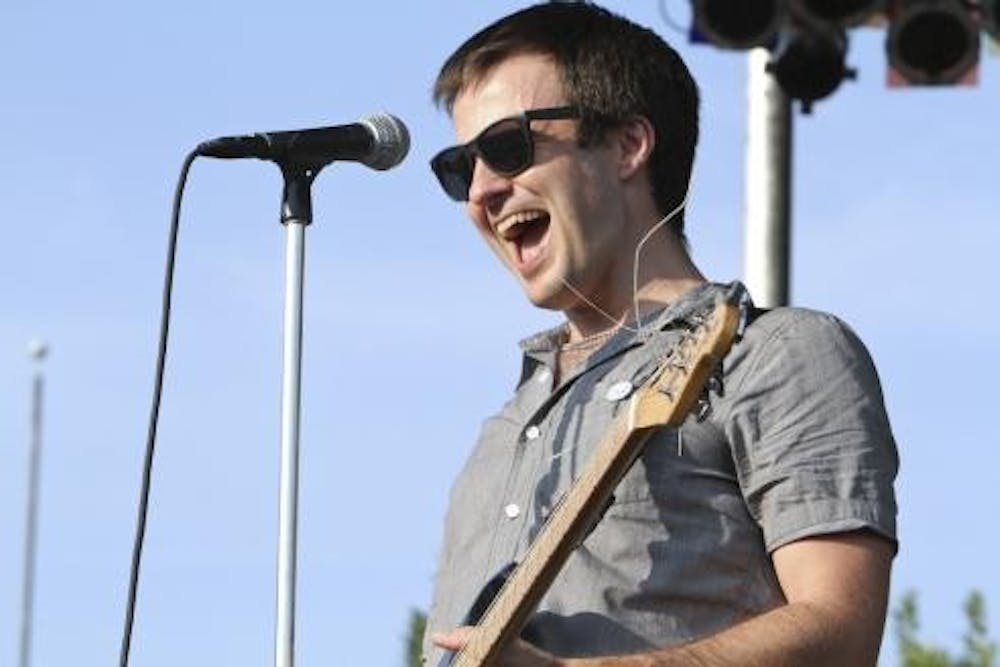tUnE-yArDs’ performance was in many ways emblematic of the Pitchfork festival as a whole — the band’s music was unconventional in a way that could put off certain listeners. But, still emblematic of the festival, tUnE-yArDs’ offbeat nature was warranted by its incredible stage presence. And even though they played one of the festival’s earliest sets, socks were rocked off and faces were melted by mesmerizing vocal looping, a bangin’ brass section, and frontwoman Merrill Garbus’s primal vocals. In a festival characterized by passive, standstill crowds whose head nods were barely perceptible, tUnE-yArDs’ set was a refreshingly intense, engaging experience that demanded dance.
Just a couple hours after tUnE-yArDs dazzled its crowd on a side stage with danceable vocal loops, James Blake, the child prodigy pianist–turned–harmonizing indie dubstepper, took the same side stage, using vocal loops to inspire a far more introspective response. Blake’s music is dark and effects–heavy, and yet his songs translated smoothly into the live realm, losing none of their emotional luster. Blake’s set hypnotized the crowd into a subdued synchrony, offering a secluded respite from what was essentially an hours–long party in the oppressive Chicago heat.
Playing a concert that is nearly two-thirds new material and appeasing a raucous festival crowd may seem antithetical, but Animal Collective miraculously accomplished both of these things on Friday night. Perhaps it is because everyone expected them to be weird, and an Animal Collective greatest hits show would have been kind of lame anyway, right? Whatever the case, the band’s five forays into their back catalogue — “Did You See The Word,” “Brother Sport,” “Taste,” “We Tigers” and “Summertime Clothes”— sounded great, especially “Brother Sport,” which provoked a rock star–worthy rush toward the stage. The new material, though often quite difficult, worked surprisingly well in the roomy confines of Union Park, and much of it possessed enough of a hypnotic pop sensibility to be evident on first listen. Though the band disappointed by not providing the “Fireworks”/ “My Girls” encore everyone wanted, they were an appropriately epic end to the best day of the festival.
The greatest testament to The Dismemberment Plan’s evening set on Saturday might be their ability to completely change minds—we had previously thought of them as an overrated hard rock band of the whiny, late 90s variety, and it was only after witnessing their live show that we were able to appreciate the complex structures and persistent attention to lyrical detail that make their songs unique. Onstage, TDP was unremittingly taut, which allowed their technical abilities to take center stage. Yet, most essentially, the band approached the festival show with a tremendous amount of energy and earnest enjoyment, rendering their songs as urgent as they must have sounded in the 20th century.
Deerhunter probably distinguished itself most in the minds of many festival-goers by being really, really loud during a weekend that was often a bit too quiet. For the attentive listener, though, Bradford Cox and Co. used these mountains of sound to the fullest, layering their already–great studio work with a bevy of live effects. Particularly effective was the transition between the set-opening, drone-heavy “White Ink” into “Desire Lines,” which was seamless and made the crowd go crazy. The show was certainly jam–heavy, though this only seemed to add to their indie rock badassery — especially on “He Would Have Laughed” and the Microcastle highlight “Nothing Ever Happened” which swelled to an absurd length before breaking into a Patti Smith cover. Though the setlist could be disconcertingly obvious at times, Deerhunter gave the fans what they wanted, and they were treated to an enthusiastic crowd in return.

